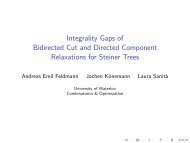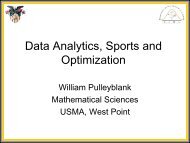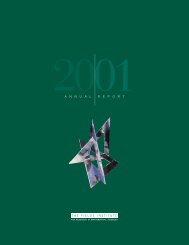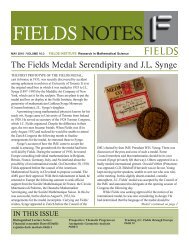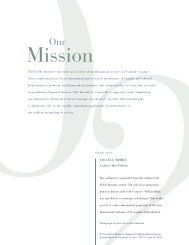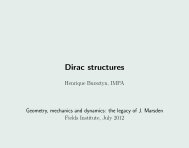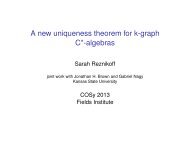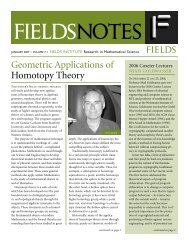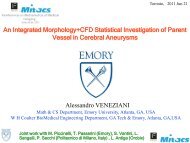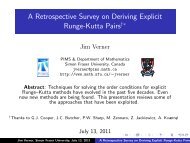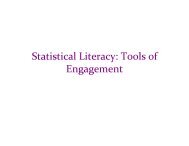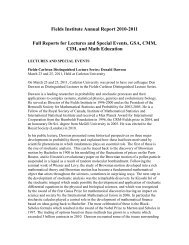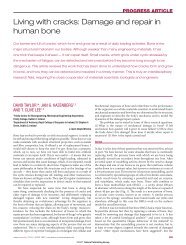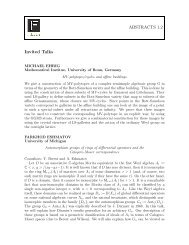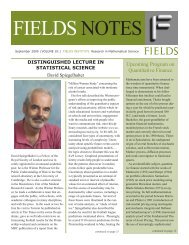Annual Report 2005 - Fields Institute - University of Toronto
Annual Report 2005 - Fields Institute - University of Toronto
Annual Report 2005 - Fields Institute - University of Toronto
You also want an ePaper? Increase the reach of your titles
YUMPU automatically turns print PDFs into web optimized ePapers that Google loves.
students at the <strong>University</strong> <strong>of</strong> Ottawa. In addition to <strong>of</strong>fering<br />
MSc and PhD degrees in traditional areas, the department<br />
also <strong>of</strong>fers an MSc program in Biostatistics, joint with the<br />
Department <strong>of</strong> Epidemiology, as well as an MSc in High<br />
Technology. Besides being a member <strong>of</strong> the <strong>Fields</strong> <strong>Institute</strong>,<br />
the department is also a member <strong>of</strong> the Centre de recherches<br />
mathématiques (CRM). The department is also proud<br />
<strong>of</strong> its postdoctoral program, which now provides about<br />
twelve postdoctoral positions. The <strong>University</strong> <strong>of</strong> Ottawa<br />
is a bilingual institution in the heart <strong>of</strong> Canada’s capital.<br />
The department benefits from its proximity to the government,<br />
with a number <strong>of</strong> appointments <strong>of</strong> adjunct pr<strong>of</strong>essors<br />
who are active mathematicians affiliated with Canadian<br />
research agencies.<br />
<strong>University</strong> <strong>of</strong> <strong>Toronto</strong><br />
Research and teaching in mathematics is carried out at the<br />
<strong>University</strong> <strong>of</strong> <strong>Toronto</strong> in the Departments <strong>of</strong> Computer Science,<br />
Mathematics, and Statistics, with a combined total <strong>of</strong><br />
over one hundred and forty faculty members.<br />
The Department <strong>of</strong> Computer Science was the first<br />
computer science department established in Canada, and<br />
is characterized by its breadth <strong>of</strong> research and teaching<br />
interests, and the high quality <strong>of</strong> its faculty and graduate<br />
students. Faculty members have won many important<br />
prizes and awards, including the Turing Award (S.A. Cook)<br />
the Fulkerson Prize in Discrete Mathematics (A. Lehman),<br />
the IJCAI Award for Research Excellence (R. Reiter) and<br />
the Order <strong>of</strong> Canada (C.C. Gotlieb). The department has<br />
produced a large proportion <strong>of</strong> the computer science Ph.D.s<br />
in Canada, and has contributed faculty members to many<br />
departments in Canada and abroad. The Department <strong>of</strong><br />
Computer Science has strong ties with the <strong>Fields</strong> <strong>Institute</strong>.<br />
Members <strong>of</strong> the department have played a central role in<br />
several <strong>Fields</strong> programs, including the recent thematic<br />
program on Numerical and Computational Challenges in<br />
Science and Engineering (2001–2002).<br />
The Department <strong>of</strong> Mathematics at the <strong>University</strong> <strong>of</strong><br />
<strong>Toronto</strong> is one <strong>of</strong> the leading mathematics research departments<br />
in Canada. Mathematics has been taught there since<br />
1827, and the department’s first PhD was conferred in<br />
1915 on Samuel Beatty – a student <strong>of</strong> John Charles <strong>Fields</strong>,<br />
whose will, established the <strong>Fields</strong> Medal and after whom<br />
the <strong>Fields</strong> <strong>Institute</strong> is named. Research in the department<br />
covers a broad spectrum, from mathematical foundations<br />
to interdisciplinary applications, from number theory and<br />
geometry to the analysis <strong>of</strong> shock waves and <strong>of</strong> financial<br />
risks. Research excellence is recognized through the high-<br />
G o v e r n a n c e<br />
est research grant average in Canada, and members <strong>of</strong> the<br />
department have delivered addresses at every International<br />
Congress <strong>of</strong> Mathematics in the recent past. The department<br />
is home to the winners <strong>of</strong> the first three CRM-<strong>Fields</strong><br />
Prizes and to the only mathematician ever awarded the<br />
Canada Gold Medal for Science and Engineering. The<br />
department is involved with the <strong>Fields</strong> <strong>Institute</strong> at all levels<br />
– through participation in its workshops and thematic programs,<br />
in events for high school teachers, and collaborative<br />
research projects within MITACS.<br />
The Department <strong>of</strong> Statistics was established in 1977, and<br />
<strong>of</strong>fers programs in actuarial science, statistics, and probability.<br />
The department has a long history <strong>of</strong> innovation<br />
and advance in the theory and foundations <strong>of</strong> statistics, and<br />
is among the leading theoretical departments in the world.<br />
It has also been for many years at the forefront <strong>of</strong> developments<br />
in statistical computing, and maintains exceptionally<br />
strong ties with the biostatistics research group in the<br />
Department <strong>of</strong> Public Health Sciences. Research activity in<br />
probability, theoretical statistics, and methods <strong>of</strong> applied<br />
statistics is vigorous and growing, and the department has<br />
recently established a research cluster <strong>of</strong> Canada Research<br />
Chairs in data mining and machine learning, jointly with<br />
the Department <strong>of</strong> Computer Science.<br />
<strong>University</strong> <strong>of</strong> Waterloo<br />
The <strong>University</strong> <strong>of</strong> Waterloo’s Faculty <strong>of</strong> Mathematics is<br />
known for its innovation and leadership in education,<br />
research, and technology transfer. With a population <strong>of</strong><br />
more than forty-six hundred full-time undergraduate and<br />
four hundred and twenty-five graduate students, and one<br />
hundred and eighty-five full-time pr<strong>of</strong>essors, Waterloo<br />
ranks as the largest centre for mathematical, statistical<br />
and computer sciences in the world. The Faculty <strong>of</strong> Mathematics<br />
<strong>of</strong>fers a broad range <strong>of</strong> studies through five units:<br />
Applied Mathematics, Combinatorics & Optimization,<br />
Computer Science, Pure Mathematics, and Statistics &<br />
Actuarial Science. Widely known for its accomplishments<br />
in computer science, it also has exceptional strength and<br />
stature in discrete mathematics, applied statistics, and<br />
actuarial science. Recently, cryptography and quantum<br />
computation have become major strengths in the Faculty.<br />
The Faculty <strong>of</strong> Mathematics generated over $12 million<br />
in research funding last year. With the <strong>University</strong>’s liberal<br />
position on intellectual property, research conducted in the<br />
Faculty has resulted in several spin-<strong>of</strong>f companies founded<br />
by pr<strong>of</strong>essors, students, and graduates. Known for its mathematics<br />
and computer contests, the success <strong>of</strong> its graduates,<br />
<strong>Fields</strong> <strong>Institute</strong> <strong>2005</strong> ANNUAL REPORT 131



